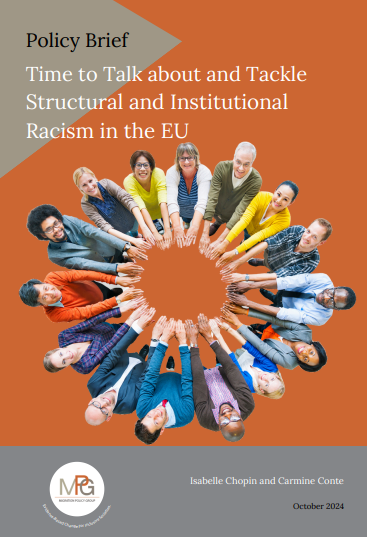On October 25, 2024, the Migration Policy Group (MPG) launched a groundbreaking policy brief, urging EU policymakers to adopt comprehensive strategies to address structural and institutional racism within the Union. This brief is the result of a two-year collaborative project involving eight EU member states—Czechia, Germany, Greece, Latvia, the Netherlands, Romania, Spain, and Sweden—and supported by the Robert Bosch Stiftung. Through comparative analyses and national workshops, MPG’s project highlights the barriers faced by racialized communities and presents actionable recommendations for decision-makers at the national and EU levels.
Persistent Barriers in Key Areas of Society
The policy brief points to systemic disparities across essential sectors such as education, employment, housing, and healthcare, where racialized communities often encounter inequalities that limit their opportunities and impact their quality of life. Although anti-discrimination frameworks exist within the EU, gaps remain in enforcing these policies effectively, and definitions of structural racism are often lacking, hindering efforts to address underlying biases.

- Education: Barriers to equal access, which contribute to educational disparities and limit future opportunities for affected communities.
- Employment: Structural inequalities result in wage gaps, reduced job mobility, and limited access to high-quality employment.
- Housing: Persistent segregation, particularly affecting communities like the Roma, restricts access to adequate housing.
- Healthcare: Disparities in healthcare access and quality contribute to both physical and mental health challenges for racialized groups.
These systemic obstacles foster mistrust in public institutions and often discourage affected communities from seeking justice or engaging with authorities.
Recommendations for Systemic Change
The policy brief emphasizes the need for decisive, EU-wide action to dismantle these entrenched inequities. Recommendations include:
1. Establishing a Robust Legal Framework
– Legal Definitions and Sanctions: Member states are urged to adopt clear legal definitions of structural racism and implement sanctions for violations, ensuring accountability across sectors.
2. Developing Comprehensive Policy Strategies
– National Anti-Racism Plans: The brief advocates for holistic national strategies that address structural racism across various sectors, rather than isolated, sector-specific approaches.
– Community Engagement: Ensuring that racialized communities have a voice in policy discussions is crucial to creating tailored solutions that meet their specific needs.
3. Enhancing Data Collection and Monitoring
– Equality Data: Collecting disaggregated data on ethnicity and racial identity is essential for identifying disparities and informing policy interventions that promote equality.
4. Addressing Policing Practices
– Ban on Racial Profiling: EU member states are encouraged to implement guidelines prohibiting racial profiling and to increase transparency in law enforcement practices.
– Access to Justice: Ensuring accessible and effective complaint processes can empower individuals to report discrimination and seek justice.
5. Promoting Public Awareness and Community Engagement
– Awareness Campaigns: Public campaigns that emphasize understanding and address structural inequality can foster a culture of inclusivity.
– Restorative Justice: Recognizing the impact of historical inequalities and exploring restorative justice initiatives can aid in bridging divides and building trust.
This policy brief underscores the importance of shifting from awareness to action, urging both EU and national policymakers to champion systemic reforms that dismantle racial barriers and foster a more inclusive society. With enhanced data collection, legal accountability, and genuine community engagement, the EU can work towards equity, ensuring that all individuals have equal access to opportunities and justice.




